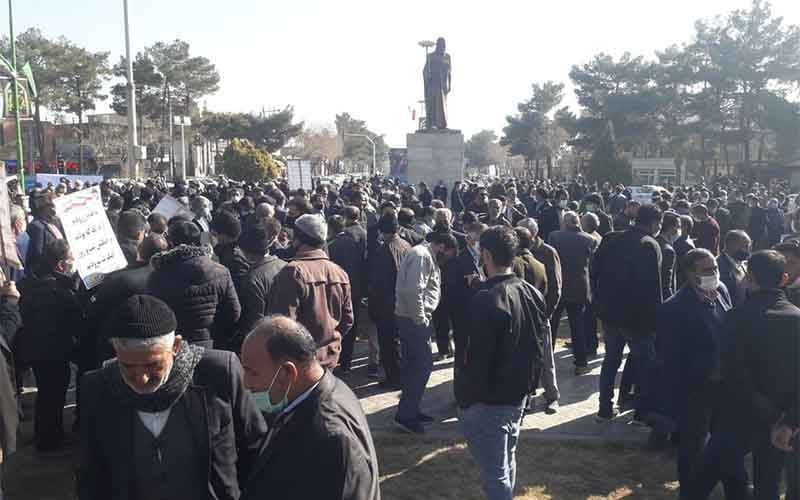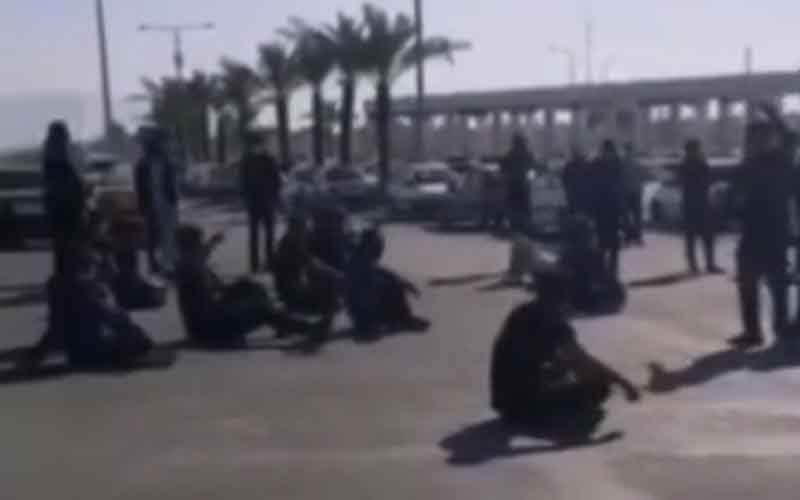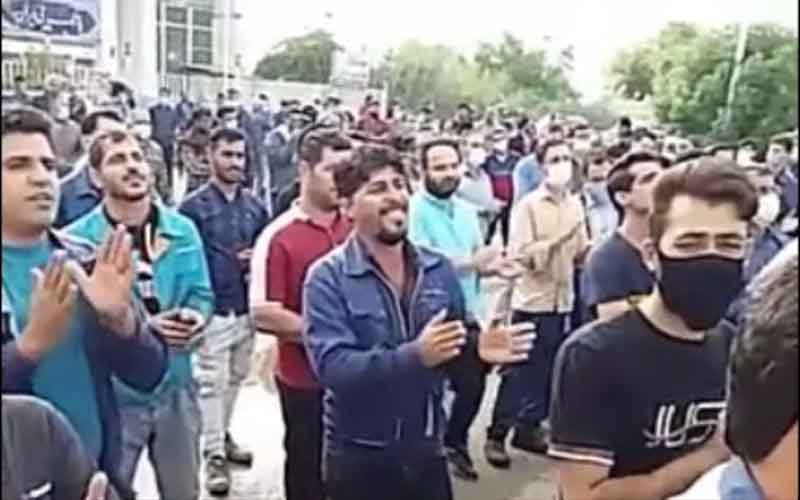On January 16, the Iranian people once again vented their anger at the regime’s plundering and profiteering policies. In this respect, they continued protests by holding at least three rallies in Isfahan and Khuzestan provinces.
In Isfahan, outraged farmers once again took to the streets, marching against unbridled extraction of Zayandehroud River’s water. In recent months, regime-backed companies have used and diverted the river’s path for their economic interests, causing drought and annihilation of farmers’ spring crops.
On the other hand, unemployed youths and Haft-Tappeh Sugarcane workers rallied in Khuzestan province. They blamed officials’ policies that brought poverty and unemployment for many families. “Death to the worker, Hail to the oppressor,” Haft-Tappeh workers sarcastically chanted, displaying their anger against the judiciary’s biased and unjust decision.

Farmers’ Protests Against Officials’ Policies
Isfahan province—farmers of eastern Isfahan city held a rally at Khurasgan Square, demanding their right to water. Then, farmers marched in Isfahan’s streets, chanting, “If you have no [prudent] official, import officials from [outside Iran],” “Farmers are aware and hate [unkept] promises,” and “Death to the liar government.”
In recent weeks, farmers time and again called on officials to stop rampant extraction of Zayandehroud River’s water. However, the regime and executive apparatuses continue their extracting plans, putting the farmers’ businesses at risk of drought.
#IranProtests#Isfahan—farmers of eastern Isfahan held a rally at Khurasgan Square. They protested officials and executive apparatuses for extracting Zayandehroud River's water, which has posed their businesses and lives at risk.
"Death to liar government," chanted farmers. pic.twitter.com/O5FDzIaY5x— IranNewsUpdate (@IranNewsUpdate1) January 17, 2021
Notably, the Revolutionary Guards (IRGC) is behind these plans and projects and has deprived impoverished farmers of the required water for agricultural needs.
IRGC-dominated companies and firms violated the farmers’ right to water when they have completed planting for their spring crops. In other words, farmers have lost their livelihood, which prompted their anger.
In their protests, farmers blamed officials’ failure to fulfill the bill approved by the regime-controlled Supreme Council of Water. In this respect, protesters demanded the implementation of Article 9 of the bill.
“We say, ‘the air is polluted,’ [officials] answer, ‘wait for wind to remove air pollution.’ We say, ‘they do not give water to farmers,’ [officials] say, ‘wait for rain.’ So, if our fate is dependent on the sky, wind, and rain, what the hell are officials doing?” said a farmer.

Rally of Unemployed Youths
Khuzestan province—unemployed youths of Shahrouei village in Behbahan county held a rally in front of Bidboland refinery plant. In recent months, they have time and again rallied at the place, demanding government-linked employers recruit them.
#IranProtests#Khuzestan—on January 16, unemployed youths held a rally in front of Behbahan Bidboland refinery, protesting regime-linked employers for hiring non-native forces instead of indigenous workers.
"CEO, who isn't ready to see protesters, must be punished," said a man. pic.twitter.com/fGCqZ4G9tP— IranNewsUpdate (@IranNewsUpdate1) January 17, 2021
Instead, employers have hired non-native forces, prompting youth and locals’ anger. On the other hand, one of the security forces insulted and showed bad behavior towards a child who was seeking work, which fueled outraged people’s wrath. “Disgrace, disgrace,” chanted protesters.
“In a company whose CEO is not ready [to confront protesters], the CEO must be severely punished… Shame on you, we will obtain our rights, you must understand this if you haven’t yet,” said a protester. “Shahrouei united, united,” the crowd chanted.

Rally of Haft-Tappeh Workers
Khuzestan province—fed-up workers of Haft-Tappeh Sugarcane Complex once again rallied demanding their inherent rights. “Death to the worker, Hail to the oppressor,” the workers sarcastically chanted, showing their anger at the judiciary’s unfair decisions.
#IranProtests#Khuzestan—fed-up workers of Haft-Tappeh Sugarcane Complex once again rallied demanding their inherent rights.
“Death to the worker, Hail to the oppressor,” sarcastically chanted workers, showing their hatred against the judiciary’s unfair decisions. pic.twitter.com/QRvBw3ucZF— IranNewsUpdate (@IranNewsUpdate1) January 17, 2021
Workers called on officials to follow up the case of Haft-Tappeh corrupt CEO Omid Assad-Beigi immediately. They criticized the judiciary for showing mercy in Assad-Beigi’s case while it easily summons and arrests impoverished workers for seeking their legal rights.
Notably, judiciary chief Ebrahim Raisi has frequently spoken about justice and fair behaviors. However, he practically ensures the regime and influential individuals’ interests at the expense of underprivileged people.
Furthermore, he has a notorious background in the execution of protesters, dissidents, and activists. Under his reign, the judiciary has increasingly used the death penalty, torture, amputation, and other corporal punishments.
Iranians Continue Protests; at Least Three Rallies and Strikes on January 15





